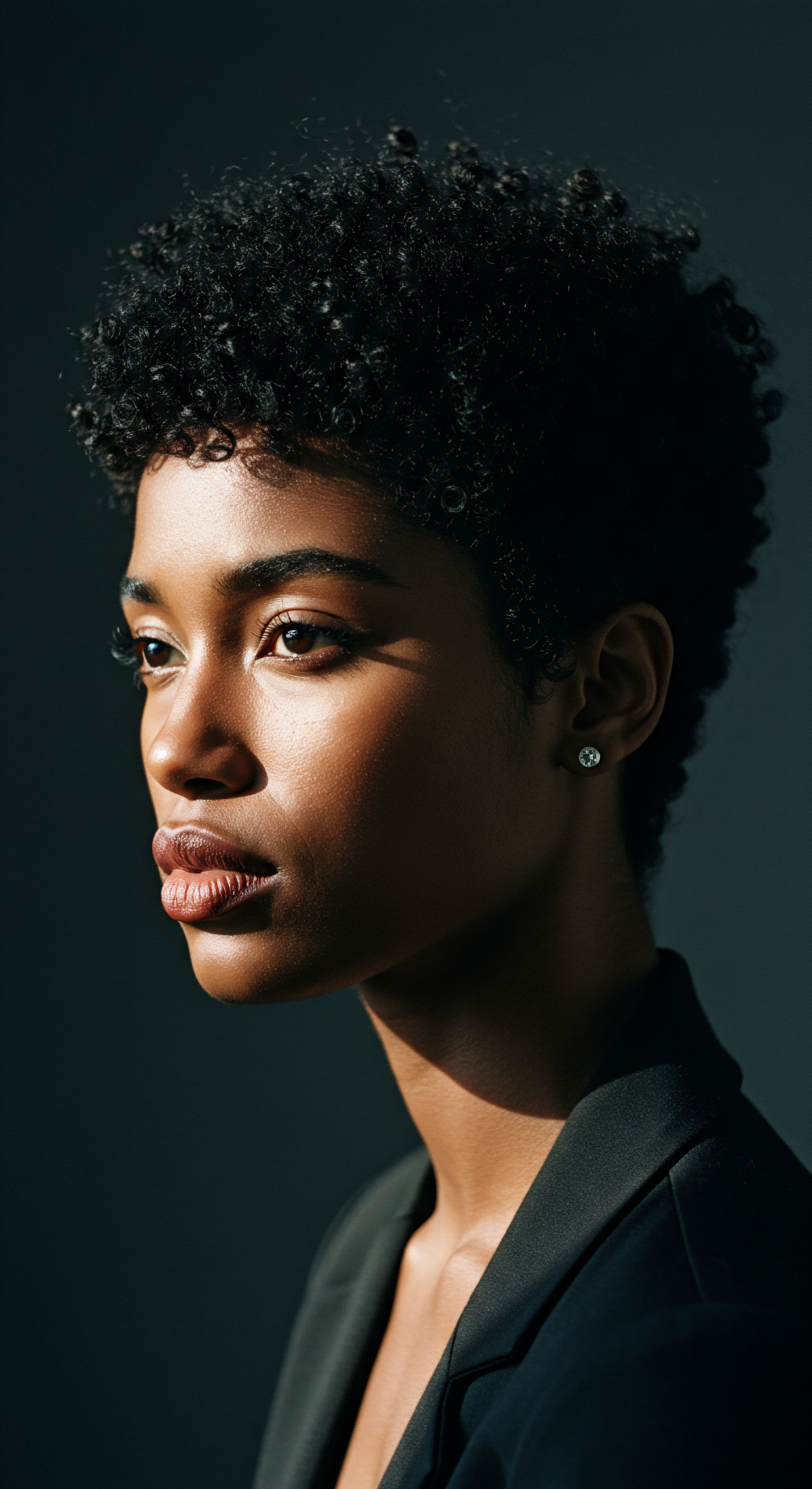
Roots
There is a quiet conversation happening within us, a continuous dialogue between our nightly slumber and the very strands that grace our heads. We often consider hair a reflection of external care, a canvas for our creativity, or a symbol of identity. Yet, its deepest truths lie in the unseen rhythms of our bodies, particularly the profound connection it shares with sleep. This exploration begins by gently pulling back the veil on the foundational biological mechanisms that link our restful hours to the vibrant life of each hair follicle, offering a perspective rooted in both the wonder of human biology and the gentle wisdom of understanding our own physical landscape.
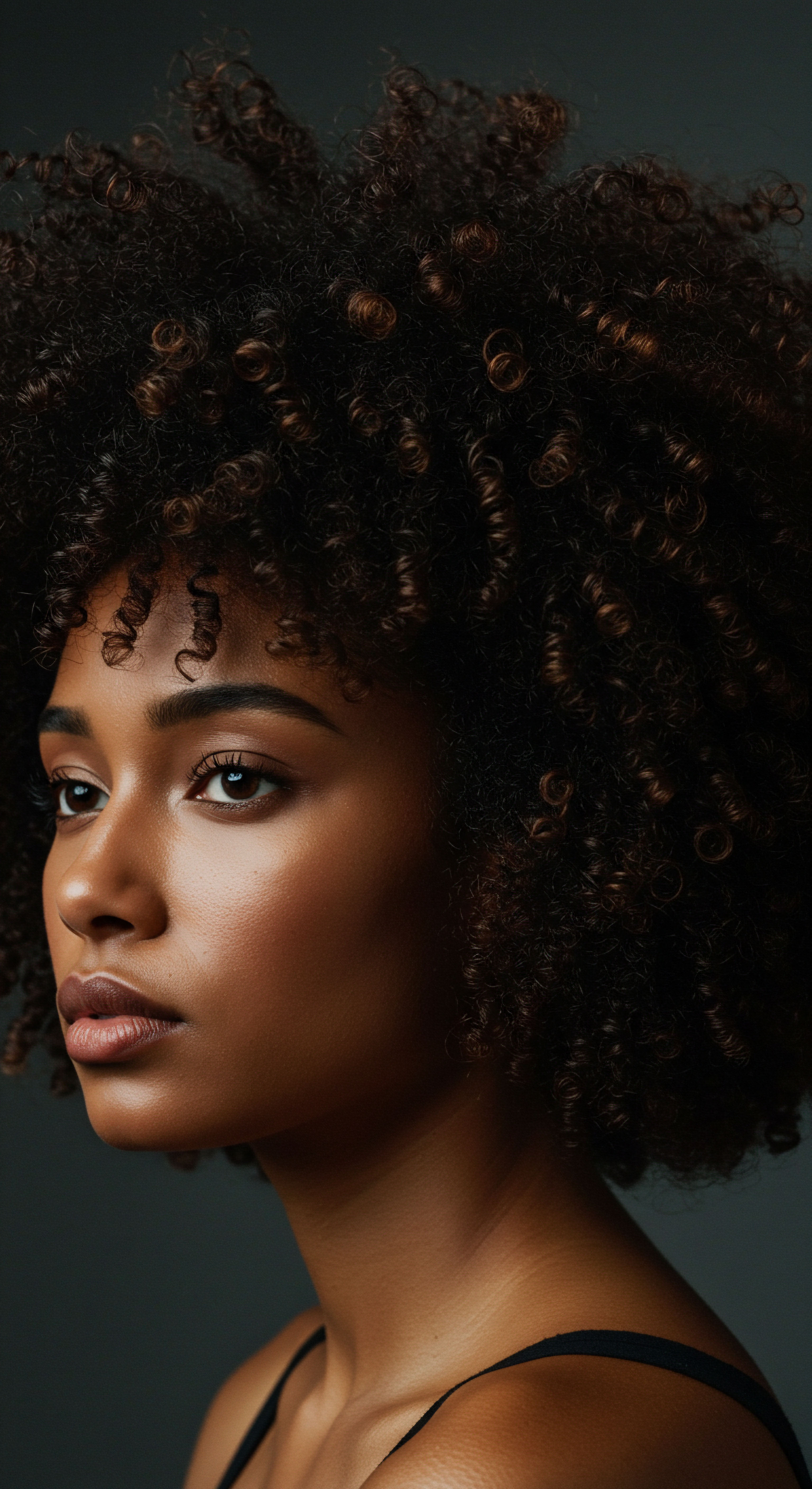
The Hair Follicle A Biological Clock
Each hair follicle, a tiny organ nestled within our skin, operates with a remarkable autonomy, yet it is intricately synchronized with the body’s larger internal timing systems. This includes the circadian rhythm, a roughly 24-hour cycle that governs a myriad of physiological processes, from hormone secretion to cell regeneration. Hair growth itself does not proceed in a continuous, linear fashion; instead, it follows a distinct cycle of growth, regression, and rest. This cyclical nature is a testament to the hair follicle’s inherent biological clock, a system influenced by the very patterns of our waking and sleeping hours.
The active growth phase, known as Anagen, is when hair cells rapidly divide and proliferate, forming the hair shaft. This phase can last for years. It transitions into Catagen, a brief period of regression, followed by Telogen, a resting phase where the hair detaches and eventually sheds. A new anagen phase then begins, renewing the cycle.

Cellular Regeneration During Sleep
The hours we spend in slumber are far from dormant for our bodies; they are a period of intense repair and regeneration. This restorative work extends deeply into the cellular structures of the hair follicle. During deep sleep, particularly the non-REM stages, the body shifts into a mode where cell turnover increases and tissue repair takes precedence.
This means that the very cells responsible for creating hair are actively replenishing and fortifying themselves. Without adequate time in these restorative sleep stages, the cellular machinery within the hair follicle can become compromised, potentially leading to a shorter anagen phase and, over time, increased shedding or slower growth.
The hair follicle, a miniature organ, dances to the rhythm of our internal biological clock, with sleep acting as a conductor for its regenerative symphony.
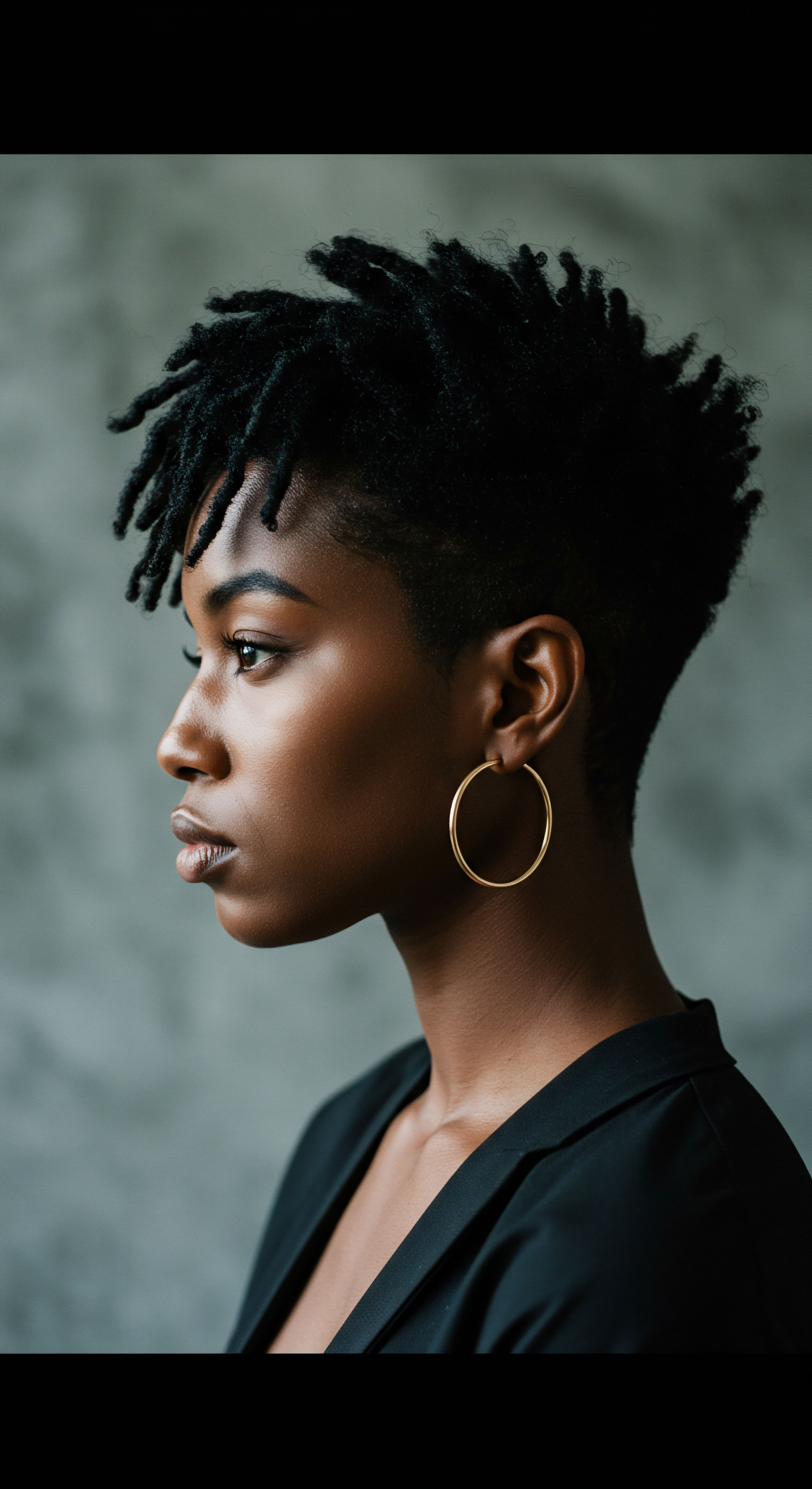
Hormonal Orchestration of Hair Growth
Sleep plays a critical role in the balanced release of hormones, many of which directly influence hair follicle function. Two prominent hormones in this interplay are melatonin and growth hormone.
- Melatonin ❉ This hormone, often recognized for its role in regulating sleep-wake cycles, also holds significance for hair growth. Research indicates that melatonin has receptors in hair follicles, helping to synchronize the hair cycle and potentially prolong the anagen phase. Its antioxidant properties may also shield follicles from oxidative stress. Disrupted sleep patterns can lead to imbalances in internal melatonin levels, which can have cascading effects on hair health.
- Growth Hormone (GH) ❉ Released primarily during deep, non-REM sleep, growth hormone is a key driver of cellular repair and regeneration throughout the body, including the keratinocytes within hair follicles. A lack of sufficient time in these deeper sleep stages can mean missing out on the optimal hormonal environment that supports hair tissue growth.
The delicate balance of these and other hormones, including estrogen, testosterone, and thyroid hormones, is essential for a healthy hair cycle. Disruptions to this balance, often a consequence of poor sleep, can manifest as thinning or breakage.
Understanding these foundational biological connections allows us to appreciate sleep not merely as a pause in our day, but as an active, vital process for the very vitality of our hair. The next steps involve exploring how our daily practices and the broader environmental context influence these intricate mechanisms.
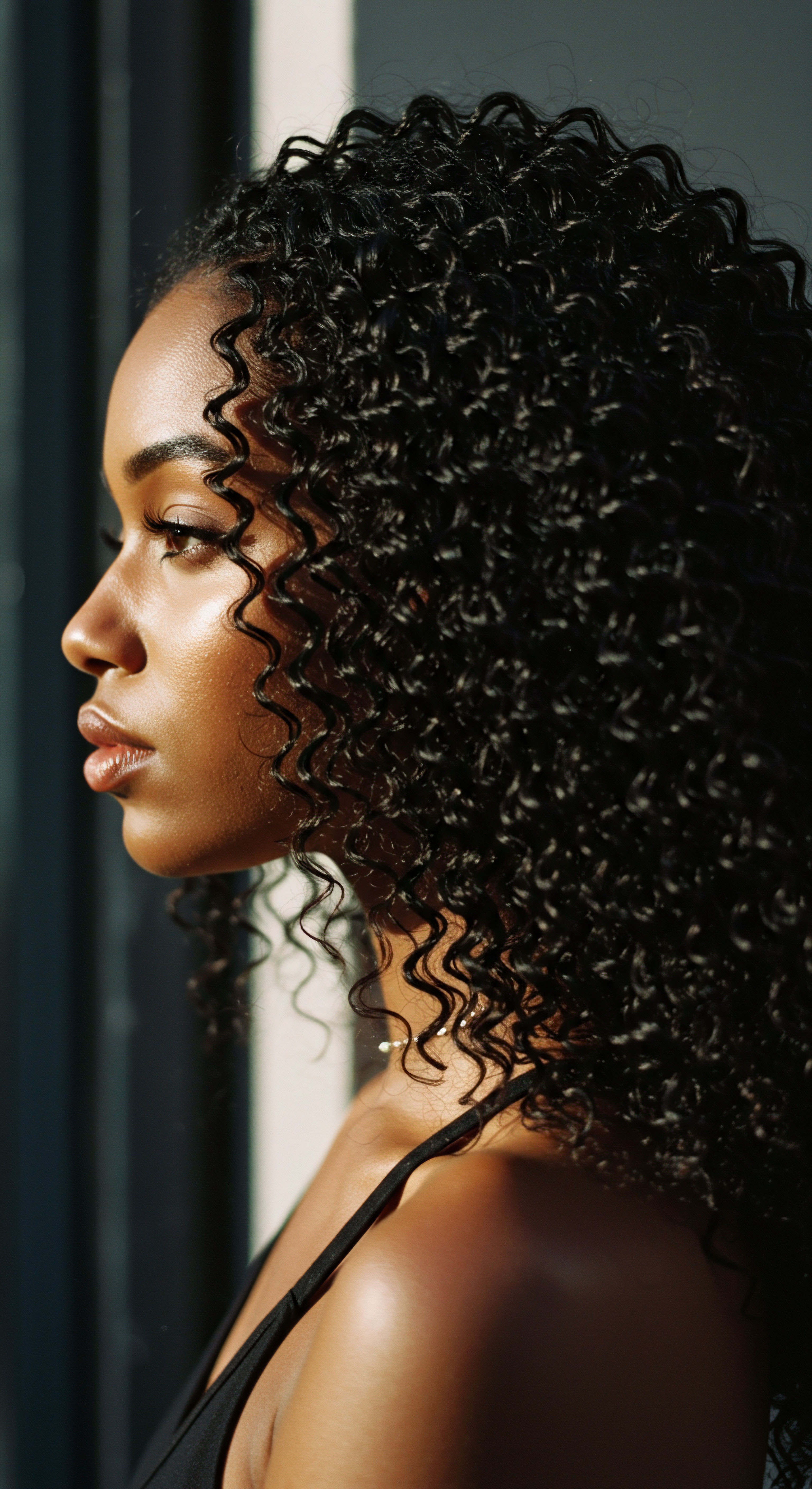
Ritual
As we turn our attention from the hidden rhythms within to the visible tapestry of our daily lives, we recognize that our interactions with sleep are not just passive experiences; they are a collection of rituals, habits, and choices that directly shape the biological narrative of our hair. The quality and consistency of our nightly rest do not simply offer a respite for our minds; they provide the essential scaffolding for our hair follicles to perform their intricate work of renewal and strength. This section offers a gentle guide into understanding how the practices surrounding our sleep, from the quiet moments before bed to the very environment we rest in, become profound contributors to hair health, moving beyond theoretical understanding into practical wisdom.

How Sleep Quality Shapes Follicle Activity
The depth and continuity of sleep profoundly influence the efficiency of cellular repair and hormonal release, which are critical for hair follicle function. Fragmented sleep, characterized by frequent awakenings or insufficient time in deep sleep stages, can disrupt the synchronized cellular processes that occur during rest. This disruption can lead to a less effective repair cycle within the hair follicle, potentially shortening the active growth phase and prolonging the resting phase. When the hair follicle’s natural rhythm is disturbed, its ability to produce robust, healthy strands is compromised.
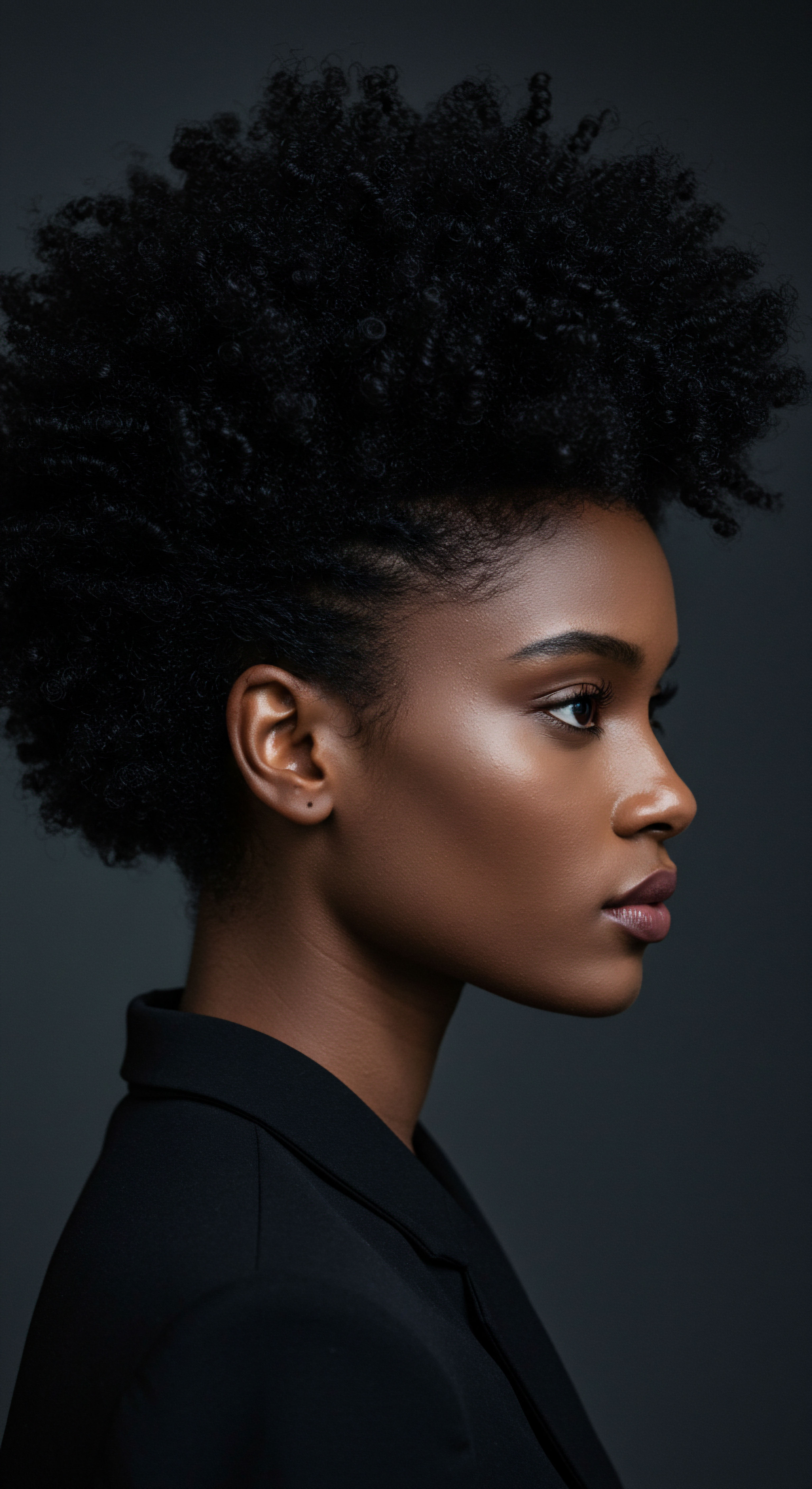
The Stress Response and Hair Follicle Resilience
One of the most widely recognized biological links between sleep and hair health centers on the body’s stress response system. Sleep deprivation acts as a physiological stressor, prompting an elevation in cortisol levels, often termed the body’s primary stress hormone. Sustained high levels of cortisol have a detrimental impact on hair follicles, pushing them prematurely into the telogen, or resting, phase. This leads to increased shedding, a condition known as telogen effluvium.
Furthermore, chronic stress, often compounded by inadequate sleep, can affect the immune system’s delicate balance. Hair follicles, particularly those in the anagen phase, possess a degree of immune privilege, a protective mechanism that shields them from immune attack. When this immune privilege is compromised by chronic stress and inflammation, it can contribute to autoimmune hair loss conditions such as alopecia areata, where the immune system mistakenly targets hair follicles.
The consistency of our sleep directly influences the resilience of our hair follicles, shielding them from the biological fallout of stress.

Circadian Rhythm and Hair Follicle Synchronicity
The body’s internal circadian clock is a master regulator, and hair follicles themselves possess their own localized circadian rhythms. These internal clocks, composed of specific “clock genes” like BMAL1 and PER1, influence the timing of cellular activity within the follicle. Disruptions to the broader circadian rhythm, such as those experienced by shift workers or due to inconsistent sleep schedules, can desynchronize these follicular clocks. This desynchronization can affect the proper progression of the hair growth cycle, potentially leading to abnormalities in hair regeneration.
| Biological Mechanism Hormonal Imbalance (Cortisol, Melatonin, GH) |
| Impact on Hair Follicle Function Altered hair growth cycle, shortened anagen, increased shedding, reduced hair matrix cell proliferation. |
| Biological Mechanism Circadian Rhythm Disruption |
| Impact on Hair Follicle Function Desynchronization of follicular clocks, impaired stem cell activity, altered hair cycle progression. |
| Biological Mechanism Reduced Blood Flow to Scalp |
| Impact on Hair Follicle Function Decreased oxygen and nutrient delivery, leading to weaker follicles and thinner hair. |
| Biological Mechanism Increased Oxidative Stress |
| Impact on Hair Follicle Function Cellular damage to follicles, inflammation, and potential hair loss. |
| Biological Mechanism Compromised Immune Privilege |
| Impact on Hair Follicle Function Increased susceptibility to inflammatory and autoimmune conditions affecting follicles. |
| Biological Mechanism These biological shifts underscore the profound influence of sleep on hair vitality. |

What Daily Habits Support Hair Follicle Health Through Sleep?
Cultivating sleep habits that honor our body’s natural rhythms can significantly support hair health. This involves creating a sleep sanctuary and adopting routines that signal to the body it is time for rest and repair.
For instance, limiting exposure to blue light from screens before bed can help maintain melatonin production, signaling to the body that night has arrived. Establishing a consistent bedtime and wake-up schedule, even on weekends, helps to reinforce the circadian rhythm, providing a stable environment for all bodily functions, including hair growth.
The practice of winding down with calming rituals, such as gentle stretching or reading, can lower cortisol levels, reducing the physiological stress that can prematurely push hair into its resting phase. Furthermore, ensuring the sleep environment is dark, quiet, and cool promotes deeper, more restorative sleep, allowing for optimal release of growth hormones and efficient cellular repair.
These conscious choices transform the act of sleeping into a powerful, regenerative ritual for the entire body, extending its gentle benefits to the very tips of our strands.
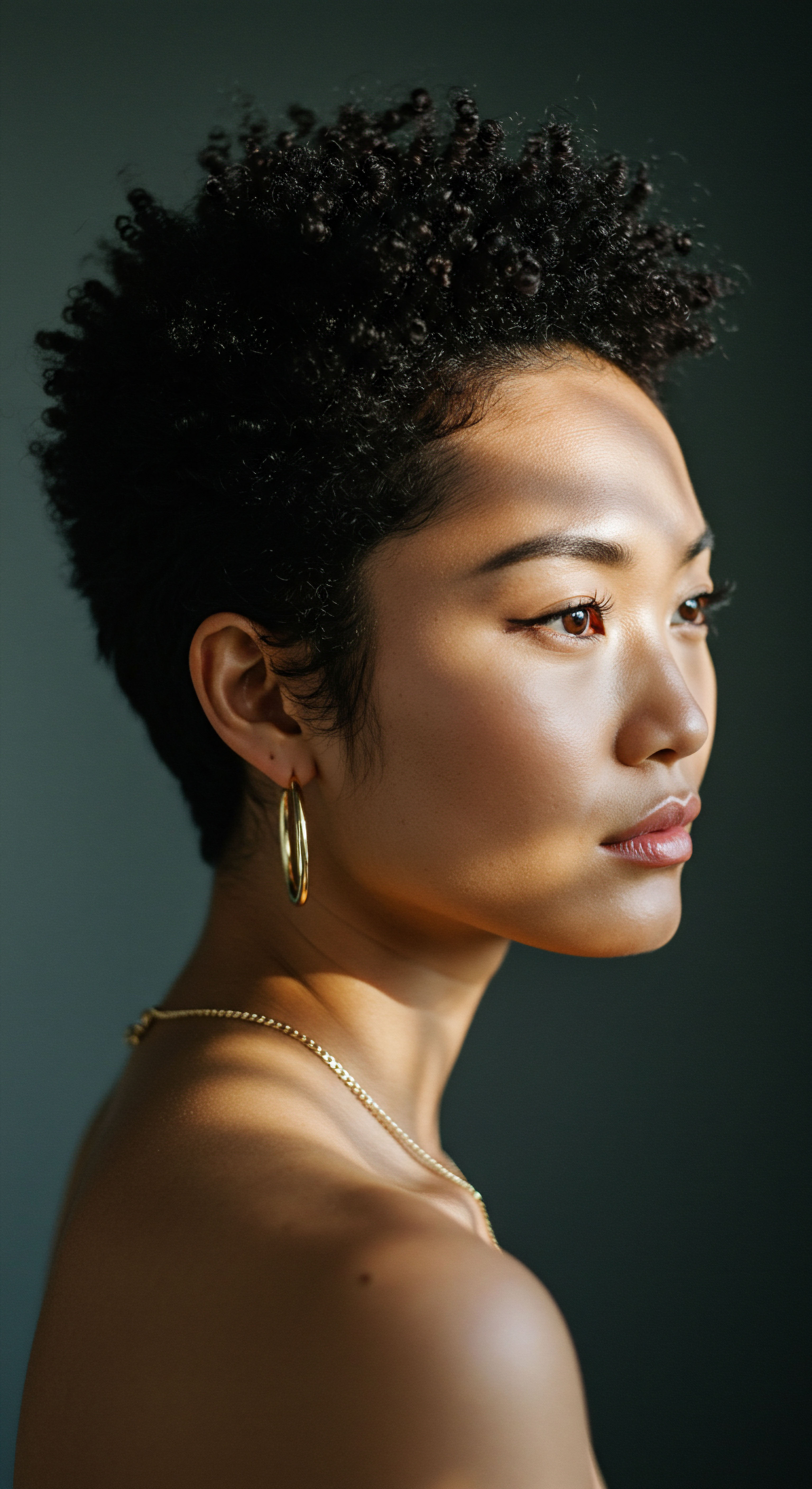
Relay
Stepping beyond the immediate connections between sleep and hair, we find ourselves at a deeper intersection where intricate biological systems converse, influencing hair vitality in ways less apparent yet profoundly impactful. This exploration delves into the subtle interplay of genetics, the immune system, and the delicate balance of the follicular microenvironment, revealing how our nightly rest acts as a sophisticated conductor for these complex biological symphonies. It is here that the nuances of our sleep patterns, often shaped by modern life, echo through our very cells, dictating the strength and resilience of our hair.

How Does Circadian Gene Expression Influence Hair Cycle Progression?
The influence of sleep on hair extends to the very blueprint of our cells, particularly through the intricate dance of circadian clock genes. While the hair growth cycle spans weeks to months, the hair follicle itself harbors a functional circadian clock, regulating gene expression over approximately 24 hours. This localized clock system, composed of core clock genes like CLOCK and BMAL1, plays a significant role in regulating the hair growth cycle.
Research indicates an unexpected connection between these two timing systems. For example, studies using mouse models have shown that mutations in core clock genes, such as BMAL1, can lead to a delay in the progression of the anagen (growth) phase of hair follicles. This suggests that circadian clock genes regulate anagen progression by influencing the cell cycle of precursor cells within the hair follicle, specifically the secondary hair germ. A disruption in these clock genes can affect cell proliferation and differentiation, which are essential for continuous hair regeneration.
This interplay highlights that consistent sleep patterns, which reinforce the broader circadian rhythm, provide a stable environment for these follicular clock genes to function optimally, thereby supporting a healthy and timely hair growth cycle.
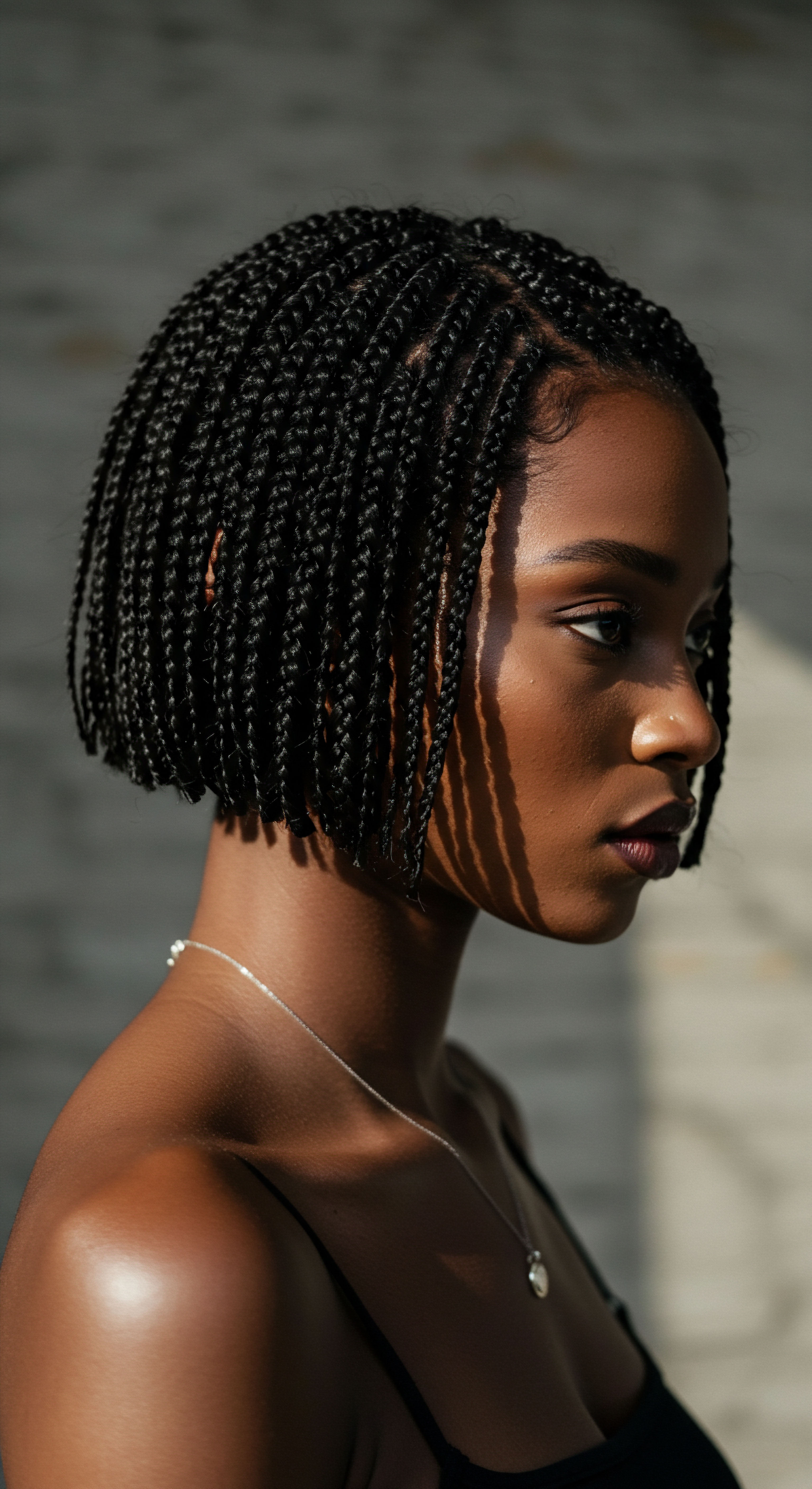
Can Oxidative Stress from Poor Sleep Harm Hair Follicle Stem Cells?
Beyond hormonal shifts, inadequate sleep contributes to an increase in oxidative stress within the body. Oxidative stress arises from an imbalance between free radicals and antioxidants, leading to cellular damage. Hair follicles, with their highly proliferative cells, are particularly susceptible to this damage. Increased reactive oxygen species (ROS), a byproduct of oxidative stress, can directly harm hair follicle cells and their vital stem cell populations.
A less commonly discussed yet impactful aspect is the link between circadian rhythm disruption and oxidative stress. Studies have shown that a loss of the circadian clock in stem cells can result in a significant increase in ROS production. For instance, research on BMAL1-deficient mice, which lack normal circadian rhythmicity, revealed elevated ROS levels.
This suggests that the circadian clock, when functioning optimally, plays a protective role in maintaining cellular redox homeostasis, minimizing oxidative damage to hair follicle stem cells. When sleep patterns are erratic, this protective mechanism weakens, leaving hair follicle stem cells vulnerable to damage, potentially leading to impaired regenerative capacity and thinner, weaker hair over time.
The intricate dance of circadian clock genes, finely tuned by sleep, protects hair follicle stem cells from the cellular damage of oxidative stress.
This deeper biological insight reveals that the impact of poor sleep extends beyond mere shedding; it can undermine the very regenerative potential of the hair follicle at a cellular level.

How Does the Immune System Intersect with Sleep and Hair Health?
The immune system and sleep are deeply intertwined, and this relationship has direct consequences for hair follicle health, particularly for those with textured hair who may experience unique inflammatory responses. Sleep is vital for proper immune and inflammatory responses, facilitating the production of both pro-inflammatory and anti-inflammatory cytokines. When sleep is consistently insufficient or disturbed, it can lead to an overactive inflammatory response, often due to sympathetic nervous system activation.
A compelling area of research, psychoneuroimmunology, explores the bidirectional relationship between psychological factors, the nervous system, and the immune system. This field illuminates how stress, often exacerbated by poor sleep, can compromise the immune privilege of hair follicles. Hair follicles possess a natural protection against immuno-allergic reactions, maintaining a state of “immune privilege” to shield themselves from immune attack. This privilege is supported by the presence of immunosuppressive factors within the follicle.
However, chronic stressors, including sustained sleep deprivation, can lead to the collapse of this immune privilege. When this occurs, the hair follicles become susceptible to immune-mediated damage, contributing to various hair loss conditions. For instance, in alopecia areata, the immune system mistakenly attacks hair follicles.
A retrospective cohort study involving 25,800 patients with sleep disorders identified sleep disorders as independent risk factors for alopecia, underscoring the profound impact of sleep on immune-mediated hair conditions. This specific finding highlights that the relationship between sleep, immunity, and hair health is not merely anecdotal but is supported by large-scale epidemiological data, revealing a critical, yet often overlooked, biological pathway for hair loss.
The sustained presence of pro-inflammatory cytokines, such as TNF-α and IL-6, which can be elevated by sleep deprivation, can directly affect hair follicle cells, promoting inflammatory skin conditions on the scalp and potentially hindering healthy hair growth.
The following list details some key cytokines and their general association with sleep and inflammation:
- Interleukin-6 (IL-6) ❉ Often elevated in both short and excessively long sleep durations, and associated with inflammatory diseases.
- Tumor Necrosis Factor-Alpha (TNF-α) ❉ A pro-inflammatory cytokine whose increased levels have been observed in sleep disorders and can stimulate the production of other inflammatory mediators.
- Interferon-Gamma (IFN-γ) ❉ Associated with immune-mediated diseases and plays a role in the collapse of hair follicle immune privilege.
This complex interplay underscores that sleep is not merely a passive state but an active immunological regulator, with direct implications for the health and resilience of our hair follicles.
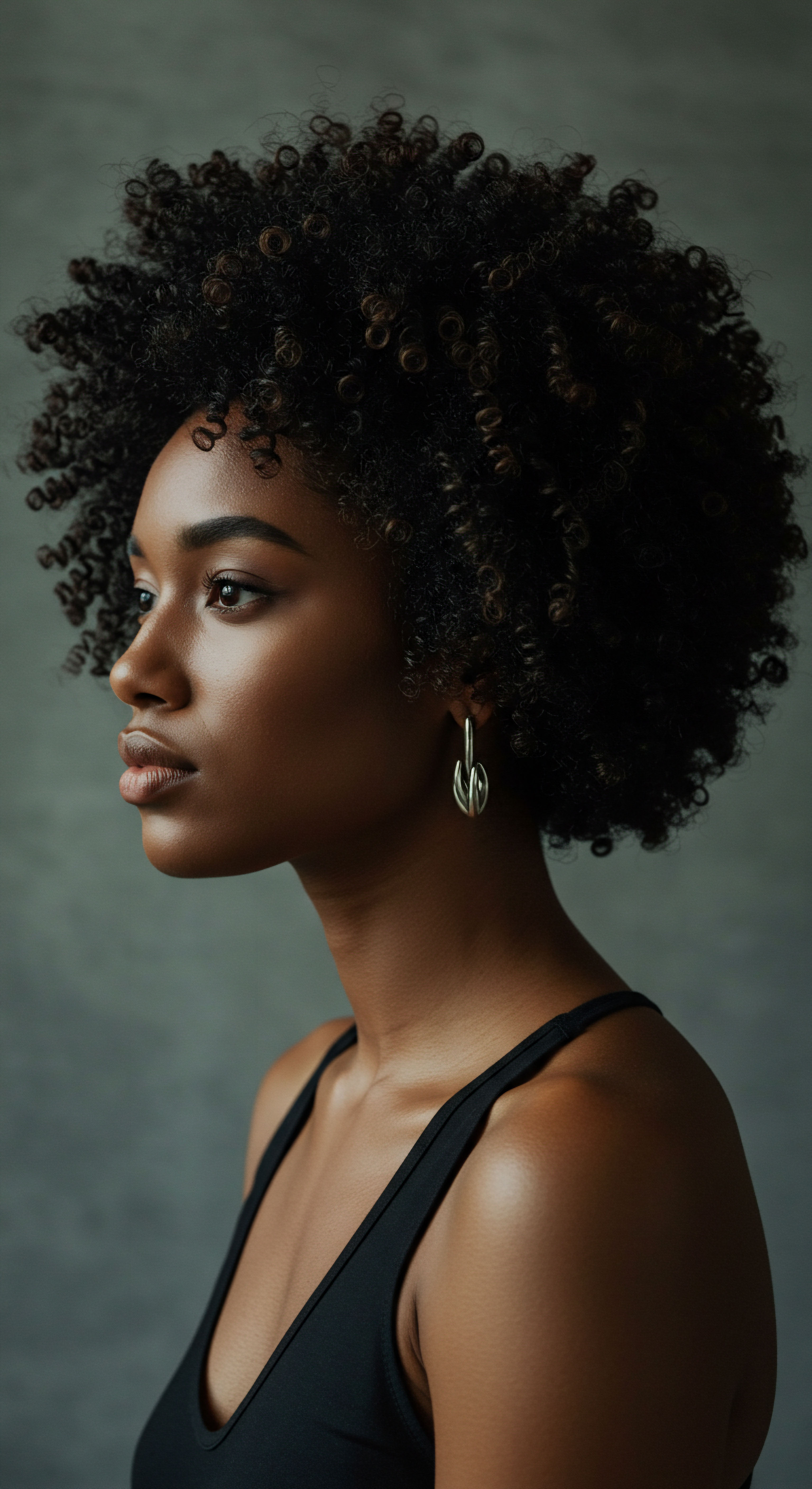
Reflection
Our journey through the intricate biological landscapes connecting sleep and hair follicle function reveals a profound truth ❉ the vitality of our strands is deeply rooted in the unseen rhythms of our nightly rest. It is a quiet testament to the body’s wisdom, where every moment of slumber orchestrates a symphony of cellular repair, hormonal balance, and immune regulation, all contributing to the resilient beauty of our hair. To honor this connection is to acknowledge that true hair wellness extends beyond topical applications; it begins within, nurtured by the gentle, restorative embrace of quality sleep.

References
- HHC Clinics. (Medically Reviewed by Dr Ali). Sleep and Hair Growth – What’s the Connection? HHC Clinics.
- DiStefano Hair Restoration Center. (2025, March 7). Does Sleep Affect Hair Health?
- MONPURE. (2024, March 15). Hair Loss ❉ Is Lack of Sleep Stunting Growth?
- Centre Clauderer. Hair and sleep ❉ the importance of the night for hair health.
- American Academy of Dermatology Association. (2024, October 2). Does Lack of Sleep Cause Hair Loss? The Science Explained.
- Typology. (2024, March 6). The consequences of a lack of sleep on your hair.
- LearnSkin. (2017, November 5). How Does the Circadian Rhythm Affect Hair Growth?
- Geyfman, M. & Andersen, B. (2009). Clock genes, hair growth and aging. Aging-US, 1(5), 406-411.
- L’Oréal Paris. (2022, August 17). How Does Sleep Affect Hair Health & Growth?
- Alam, M. et al. (2019). Stimulation of GHRs in HFs ex vivo has shown to inhibit hair growth in female human scalp HFs via upregulation of TGF-β2. (Cited in Growth Hormone and the Human Hair Follicle)
- Clinikally. (2024, July 16). Impact of Sleep Deprivation on Hair Health.
- Natural Medicine Journal. (2021, February 3). Stress, Immunity, and Hair Health.
- Niu, Y. Wang, Y. Chen, H. & Liu, J. (2023). Relationship between the molecular circadian clock and hair cycle. ResearchGate.
- Hair Doctors. (2025, April 2). Can Lack of Sleep Make You Lose Hair? Uncovering the Connection.
- Lin, K. K. et al. (2009). Circadian Clock Genes Contribute to the Regulation of Hair Follicle Cycling. PLOS Genetics, 5(5), e1000501.
- Vegamour. (2022, June 8). Inflammatory Cytokines & Hair Loss ❉ What You Should Know.
- Hårklinikken Dubai. How Oxidative Stress Affects The Scalp and Hair.
- ResearchGate. (2022, June). Clock genes, hair growth and aging.
- La Bonne Brosse. (2025, April 25). Lack of Sleep ❉ What Impact on Hair Health?
- Asmed Hair Transplant. Sleep and Hair Loss ❉ Can Lack of Sleep Cause Hair Loss?
- Fruitnroot. How lack of sleep affects your hair.
- TrichoLab. (2023, May 23). Does Sleep Really Matter for Hair Growth.
- Gabrilovac, J. (2008). Neuroendokrina regulacija imunosnog odgovara u koži. U ❉ Boranić M i sur, ur. Psihoneuroimunologija. Zagreb ❉ Školska knjiga. (Cited in Psychoneuroimmunology and Skin Diseases)
- RHRLI. What Is Oxidative Stress And What Is Its Impact on Hair Health.
- Wang, Y. et al. (2023). Hair Follicles as a Critical Model for Monitoring the Circadian Clock. International Journal of Molecular Sciences, 24(3), 2736.
- Stalder, T. et al. (2012). Analysis of Cortisol in Hair—State of the Art and Future Directions. Brain, Behavior, and Immunity, 26(7), 1019-1029. (Cited in Hair Cortisol Concentration as a Biomarker of Sleep Quality and Related Disorders)
- Pan, L. et al. (2023). Overview of the Circadian Clock in the Hair Follicle Cycle. Cells, 12(13), 1729.
- Honeyman, J. F. (2016). Psychoneuroimmunology and the skin. Acta Dermato-Venereologica, 96(217), 38-46.
- Honeyman, J. F. (2016, June 9). Psychoneuroimmunology and the Skin. Acta Dermato-Venereologica.
- Gilbert, M. (2022, August 17). Does Lack of Sleep Affect Hair? An expert explains the relationship between sleep and healthy hair, plus hair growth. L’Oréal Paris.
- Li, Y. et al. (2022). The Efficacy and Psychoneuroimmunology Mechanism of Camouflage Combined With Psychotherapy in Vitiligo Treatment. Frontiers in Immunology, 13, 868875.
- de Almeida, M. C. et al. (2012). Sleep Loss and Cytokines Levels in an Experimental Model of Psoriasis. PLoS ONE, 7(11), e49110.
- Maes, M. et al. (2021). Sleep Problems in Chronic Inflammatory Diseases ❉ Prevalence, Treatment, and New Perspectives ❉ A Narrative Review. International Journal of Molecular Sciences, 22(18), 9991.
- Harvard University. (2024, February 27). Genetics, Aging and Sleep ❉ Genetics of Sleep. Division of Sleep Medicine.
- Alam, M. et al. (2019). Stimulation of GHRs in HFs ex vivo has shown to inhibit hair growth in female human scalp HFs via upregulation of TGF-β2. ResearchGate.
- Su, H. Y. et al. (2000). Insulin-like growth factor 1 and hair growth. Dermatology Online Journal, 5(2), 1.